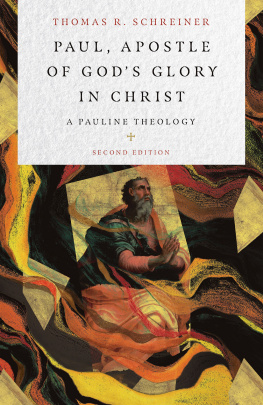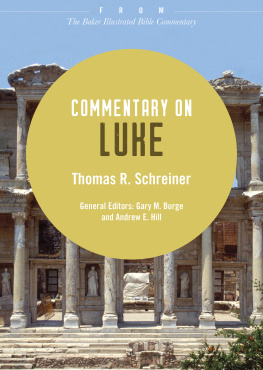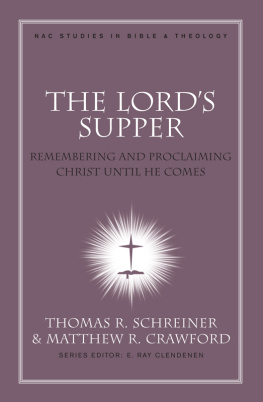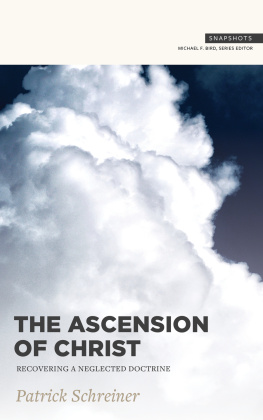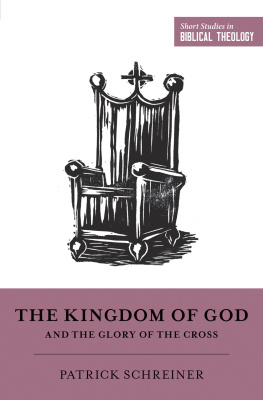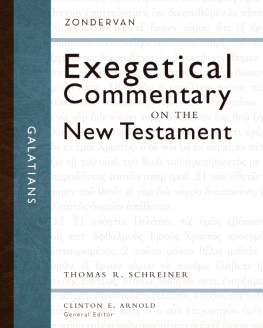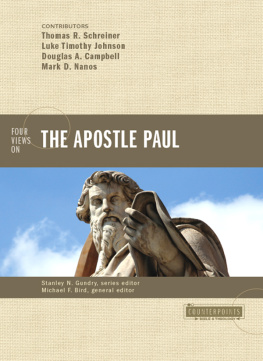Thank you for downloading this Crossway book.
Sign-up for the Crossway Newsletter for updates on special offers, new resources, and exciting global ministry initiatives:
Crossway Newsletter
Or, if you prefer, we would love to connect with you online:
Facebook
Twitter
Google +
Run to Win the Prize
Copyright 2010 by Thomas R. Schreiner
Published by Crossway
1300 Crescent Street
Wheaton, Illinois 60187
British Edition: Apollos (an imprint of Inter-Varsity Press), Norton Street, Nottingham NG7 3HR, England
All rights reserved. No part of this publication may be reproduced, stored in a retrieval system, or transmitted in any form by any means, electronic, mechanical, photocopy, recording, or otherwise, without the prior permission of the publisher, except as provided for by USA copyright law.
Cover design: Faceout Studio, www.faceoutstudio.com
Cover photo: Getty Images
First printing 2010
Printed in the United States of America
Unless otherwise indicated, Scripture quotations are from the ESV Bible ( The Holy Bible, English Standard Version ), copyright 2001 by Crossway. Used by permission. All rights reserved.
Scripture quotations marked KJV are taken from the King James Version of the Bible.
Scripture quotations marked nasb are from The New American Standard Bible. The Lockman Foundation 1960, 1962, 1963, 1968, 1971, 1972, 1973, 1975, 1977, 1995. Used by permission.
Scripture references marked NRSV are from The New Revised Standard Version. Copyright 1989 by the Division of Christian Education of the National Council of the Churches of Christ in the U.S.A. Published by Thomas Nelson, Inc. Used by permission of the National Council of the Churches of Christ in the U.S.A.
Italics in biblical quotes indicate emphasis added.
ISBN-13: 978-1-4335-1436-4
ISBN-10: 1-4335-1436-2
Library of Congress Cataloging-in-Publication Data
Schreiner, Thomas R.
R un to win the prize : perseverance in the New Testament / Thomas R. Schreiner
p. cm.
Includes bibliographical references and index.
ISBN 13: 978-1-4335-1436-4 (tpb)
ISBN 10: 978-1-4335-1436-2 (tpb)
1 . Perseverance (Theology)Biblical teaching. I. Title.
BS2545.P58S35 2010
2009044176
234dc22
Crossway is a publishing ministry of Good News Publishers.
VP 19 18 17 16 15 14 13 12 11 10
15 14 13 12 11 10 9 8 7 6 5 4 3 2 1
CONTENTS
O ne of the most spectacular walks in the Lake District is Striding Edge. It is a long, narrow crest of mountain, with the ground dropping sharply away on either side. It is wonderful to walk along, but there is always the thought that one cannot stray too far on either side. In some ways the doctrine of perseverance is rather like that. When understood and lived by correctly, it is breathtaking, but there are errors on either side.
On the one hand a Christian can downplay the significance of perseverance and biblical passages that warn of apostasy. The result can be a complacent faith that responds only too feebly to assaults and temptations, if it responds at all.
On the other hand, a Christian can insist on the doctrine of perseverance in a way that makes it differ very little from a work that we contribute to our salvation. It can seem that God himself cannot save us without the effort we bring. For some, that can breed habits of spiritual pride; for others, that can lead to doubt and insecurity, or even despair, since they are only too aware of how far and how frequently they fall short of the standards of holiness God has set out.
Furthermore, some exegetically demanding passages of Scripture are at stake in these debates, and it is perhaps no great surprise that ministers are wary of teaching congregations about this subject. Yet, of course, it is very difficult for pastors of Gods people to not, in effect, adopt some position on perseverance.
It is therefore of great benefit to have Thomas Schreiners reflections in this book, based on the lectures he delivered at the 2008 Oak Hill Theological College School of Theology. This is not the first time Professor Schreiner has addressed this subject (with Ardel B. Caneday he has written The Race Set Before Us: A Biblical Theology of Perseverance and Assurance ), but the present work provides the opportunity both for summary and for a tight focus on issues particularly prone to misunderstanding.
Professor Schreiner reminds us of some simple but profound biblical truths. To begin with, there is a difference between perfection and perseverance. Perfection is not possible before our glorification in Christ, and our present condition is marked by the way we are both justified and sinners and must battle to put to death the deeds of the flesh.
Perseverance is Christ focused, a sustained looking to him and to no other person and no other thing. It is intimately related to the faith through which we are saved. If faith is the open, empty hand that receives Christ, perseverance is keeping the hand open to Christ. Perseverance is not a work that we bring to finalize our salvation.
What role, then, do passages such as Hebrews 6 play in the life of the believer? Professor Schreiner points out that just as God is pleased sovereignly to call men and women to faith in Christ through human means, so too he preserves us through human means. The passages in question, therefore, are looking forward and are warnings, not descriptions of what has already taken place. Their purpose is to preserve, and they are means by which God does so. Our prayer is that this book is likewise used as a human means by God to glorify himself by encouraging, warning, and sustaining his people.
Mike Ovey
Oak Hill College, London
______________________
Thomas R. Schreiner and Ardel B. Caneday, The Race Set Before Us: A Biblical Theology of Perseverance and Assurance (Downers Grove, IL: InterVarsity Press; Leicester: Inter-Varsity Press, 2001).
one
L et me begin with two stories to illustrate the concerns of this book. Years ago a young woman and her husband came to a Bible study I was leading. Two days after the Bible study they visited our house for dinner, and she expressed a keen desire to become a Christian. I was hesitant because she knew so little about the Christian faith. Nevertheless, I concluded that I might be resisting the Holy Spirit, and one thing led to another, and she confessed Jesus as her Savior that night in our living room. I assured her after her confession of faith that she was securely saved forever, that nothing she did could remove her from the eternal life that was hers. Her husband shortly thereafter followed her in the same faith. They both grew rapidly in the faith during the next year, and we were regularly involved in Bible studies with them. But a year after her confession of faith, she changed dramatically. She decided to divorce her husband, quit attending church, and ceased going to Bible studies. I pleaded with her to at least go to counseling, but to no avail. All of this happened many years ago, and I have since lost all contact with her, though I know there was no change of mind or repentance in the next fifteen years.
The other story also relates to a friend who prayed with me to become a believer. I saw the radiance and joy in her life. She began to grow in remarkable ways. And yet in a year or two the early bloom of her faith began to fade. She began to get drunk on a fairly regular basis. She ended up living with a person who was an adherent of Buddhism. On one occasion I said to her, By this we know that we have come to know him, if we keep his commandments (1 John 2:3). A number of years passed. She broke off the relationship with the first man and ended up getting married to another. Still no desire for the things of God and Jesus Christ manifested itself. And yet, after a few years of marriage, a change began to take place. Her desire to follow the Lord resurfaced, and she began to read Scripture, pray, and take her church involvement seriously. Once again she began to talk to me about spiritual matters. She gave every indication that she belonged to Jesus Christ and that she loved him. A significant period of time had intervened between her first confession of faith and the return to her first love. Was her first experience a sham, so that she was truly saved the second time? Or did she lose her salvation and regain it later? Or was she a believer the entire time, with a temporary lapse in her faith and obedience?



